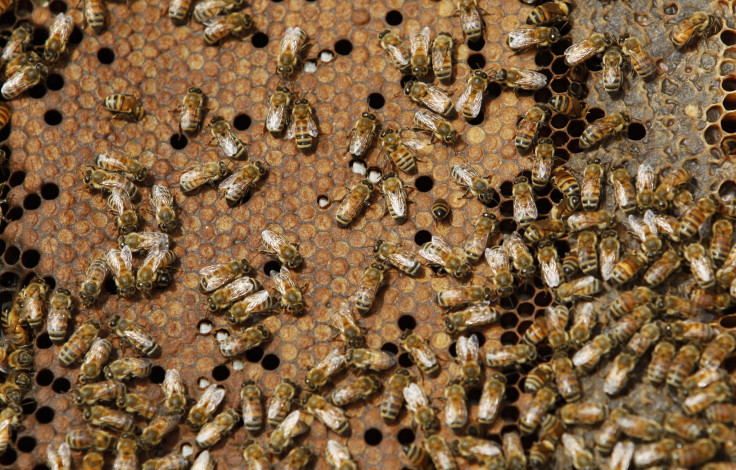60,000 Honey Bees Found In Westfield, NJ: Beekeeper Relocating ‘Wonderful’ Colony To Local Church

A New Jersey family doing some construction on their house discovered that they’d been sharing their home with some unexpected inhabitants. The Cabral family in Westfield, N.J., had hired contractors to work on their home when they stumbled upon a colony of as many as 60,000 honey bees.
“They started to work on that side of our house … and they started seeing big swarms of bees above them,” Molly Cabral told News 12. “They were nervous, obviously.”
The Cabrals called in Mickey Hegedus, a notorious third-generation Brooklyn beekeeper who began generating buzz for himself two years ago with a series of naked beekeeping videos. Hegedus, better known on YouTube as the Brooklyn BeeTzar, uses the videos to showcase “safe” beekeeping practices.
“This is probably the biggest colony I’ve taken out of a house. Especially here in Westfield,” Hegedus said, referring to the giant hive of bees residing in the Cabrals’ roof. “It’s wonderful to see them this healthy.”
What Hegedus was undoubtedly referring to, is the current plight of honey bees. Since 2006, honey bees all over the world have seen a tremendous drop in numbers due to what scientists have dubbed Colony Collapse Disorder, a bizarre phenomenon in which bees were leaving behind their colonies without any apparent explanation. In a 2007 appearance on “60 Minutes” Pennsylvania beekeeper David Hackenberg reported that he had lost two-thirds of his bees due to the phenomenon, and other beekeepers quickly corroborated his claims.
"Almost one-third of everything we eat is pollenated by honey bees," Hegedus said. "Fruit and vegetables … so, without them, we are in serious trouble."
In May, the United States Department of Agriculture issued a report on the sudden downturn in honey bee health, concluding that, “a complex set of stressors and pathogens is associated with CCD, and researchers are increasingly using multi-factorial approaches to studying causes of colony losses.”
In New Jersey, approximately one third of the honey bees perished during the winter, NJ.com reported. “It used to be you could get through a winter losing 10% to 15% of your bees," Janet Katz, president of the New Jersey Beekeepers Association, told the publication. "Now it’s double that, if not more. A bee colony could comprise anywhere from 50,000 to 80,000 bees."
Thrilled with the discovery of a thriving population, Hegedus consequently decided to relocate the healthy bees and set up a colony at a nearby Roselle Park church with a special vaccum. Hegedus also said that he would be removing any honey, or extra residue left behind by the bees.
“It’s a great attractant for any other kinds of bugs, insects, cockroaches, mice, that sort of thing,” Hegedus said. “So you want to make sure you get rid of the food source when you get rid of the colony.”
© Copyright IBTimes 2024. All rights reserved.





















